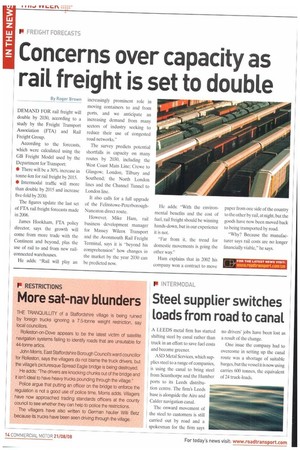Concerns over capacity as rail freight is set to double
Page 14

If you've noticed an error in this article please click here to report it so we can fix it.
By Roger Brown
DEMAND FOR rail freight will double by 2030, according to a study by the Freight Transport Association (PTA) and Rail Freight Group.
According to the forecasts, which were calculated using the GB Freight Model used by the Department for Transport: • There will be a 30% increase in tonne-km for rail freight by 2015.
• Intermodal traffic will more than double by 2015 and increase five-fold by 2030.
The figures update the last set of PTA rail freight forecasts made in 2006.
James Hookham, PTA policy director, says the growth will come from more trade with the Continent and beyond, plus the use of rail to and from new railconnected warehouses.
He adds: "Rail will play an increasingly prominent role in moving containers to and from ports, and we anticipate an increasing demand from many sectors of industry seeking to reduce their use of congested road networks."
The survey predicts potential shortfalls in capacity on many routes by 2030, including the West Coast Main Line; Crewe to Glasgow; London, Tilbury and Southend; the North London lines and the Channel Tunnel to London line.
It also calls for a full upgrade of the Felixstowe-PeterboroughNuneaton direct route.
However, Mike Ham, rail business development manager for Massey Wilcox Transport and the Avonmouth Rail Freight Terminal, says it is "beyond his comprehension" how changes in the market by the year 2030 can be predicted now. He adds: "With the environmental benefits and the cost of fuel, rail freight should be winning hands-down, but in our experience it is not.
"Far from it, the trend for domestic movements is going the other way."
Ham explains that in 2002 his company won a contract to move paper from one side of the country to the other by rail, at night, but the goods have now been moved back to being transported by road.
"Why? Because the manufacturer says rail costs are no longer financially viable," he says. FF.,












































































































































































